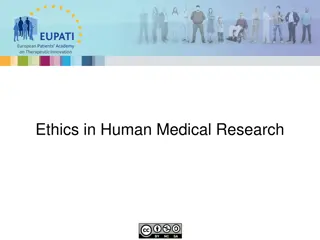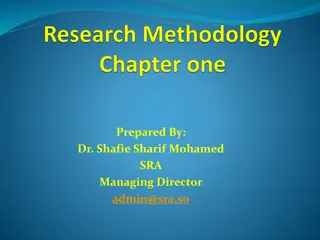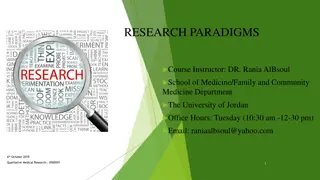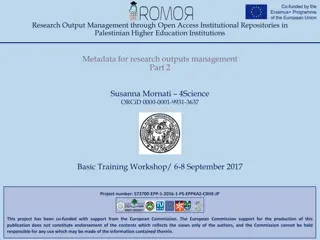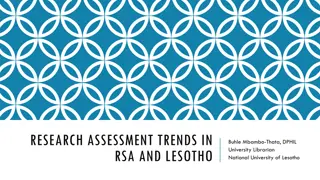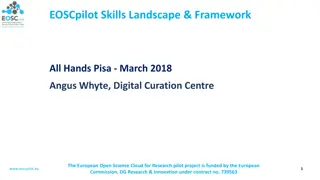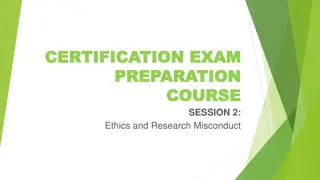Understanding Responsible Conduct of Research and IRB Overview
Delve into the world of research ethics through an overview of Institutional Review Boards (IRB), regulations governing human subjects research, historical events shaping research ethics, and examples of research controversies. Explore key ethical principles and the role of the IRB in protecting res
3 views • 34 slides
Principles of the Ghana Civil Service Code of Conduct
The Code of Conduct for the Ghana Civil Service, outlined by Elizabeth Obeng-Yeboah, emphasizes principles such as abiding by the constitution and laws with dignity, integrity, and professionalism. It sets standards for conduct, avoiding conflicts of interest, maintaining political neutrality, and u
1 views • 34 slides
Academic Freedom and Shared Governance in Higher Education
Academic Freedom and Shared Governance are foundational principles advocated by the American Association of University Professors (AAUP) to ensure educators have the freedom to explore, research, teach, and discuss without censorship. These principles empower educators to enhance student learning an
0 views • 9 slides
Essential Principles of Management Discussed in Seminar
Explore the foundational principles of management discussed in a seminar on principles of management. Delve into topics such as division of work, authority, discipline, unity of command, and unity of direction as outlined by Henri Fayol. Gain insights into the importance of these principles for effe
0 views • 22 slides
UCC Research Support and Strategies Overview
UCC's Research Support, Policy & Strategy function, led by David O'Connell, PhD, provides comprehensive support for research activities at the university. The office manages research funding, monitors performance, and facilitates engagement with external stakeholders. UCC's involvement in Horizon Eu
3 views • 17 slides
International Law of War: Nuremberg Principles and Accountability
The Nuremberg Principles, derived from the trials of Nazi officials for war crimes, establish accountability in international law. These principles hold individuals responsible for committing acts considered crimes under international law, regardless of their position or orders received. The assumpt
2 views • 22 slides
Promoting Ethical Principles in Social Science Research
Explore the challenges and strategies for translating and applying ethical principles, especially in emergency contexts. Learn key questions in social science research and how to ensure information contributes to community actions. Understand the importance of considering ethical principles in all w
0 views • 21 slides
Evolution of Ethical Principles in Medical Research: A Historical Perspective
Explore the evolution of ethical principles in medical research, from the pioneering works of Hippocrates and Edward Jenner to the post-WWII establishment of principles like voluntary informed consent. Learn about key events such as the Thalidomide scandal and the development of the Declaration of H
0 views • 10 slides
Ethical Practices in Research Studies: Guidelines and Responsibilities
This overview covers key aspects of working with research study participants, including ethical principles, protecting privacy and data security, team responsibilities, and important research ethics highlights. It emphasizes the importance of thorough training, understanding ethical principles, and
0 views • 48 slides
Ethical Principles and Research Misconduct in Clinical Research
This session discusses the essential ethical principles governing clinical research, including respect, justice, beneficence, autonomy, and non-maleficence. It explores key documents like the Belmont Report, Nuremburg Code, and Declaration of Helsinki, emphasizing the importance of ethical conduct i
0 views • 55 slides
Effective Proposal Writing for Health Research
Learn about the fundamentals of research proposals for health-related studies, including defining research, understanding the purposes of health research, and exploring motivation for undertaking research. Discover the difference between basic and applied research, examine types of research, and del
1 views • 70 slides
Overview of Research Problem Identification and Formulation
Understanding the importance of defining a research problem, this content delves into the selection and formulation of research problems, the definition of a research problem, reasons for defining it, methods for identifying research problems, sources of research problems, and considerations in sele
1 views • 11 slides
Ensuring Ethical Approval for Research: Guidelines and Procedures
Research governance, ethical frameworks, and institutional procedures play crucial roles in ensuring the integrity and quality of academic research. The ESRC Research Ethics Framework outlines key principles for conducting research ethically, emphasizing transparency, participant consent, and risk m
0 views • 22 slides
Understanding the Essence of Research: A Comprehensive Overview
Research is a systematic pursuit of new knowledge, aiming to unveil hidden truths through data collection and analysis. This course outline delves into the fundamentals of research, covering topics such as types of research studies, importance of research, and distinctions between pure and applied r
3 views • 32 slides
Epic Tools for Clinical Research by Shara Power, RN, BSN, OCN
Explore Epic tools for clinical research developed by Shara Power, a skilled application developer specializing in EPIC Beacon Oncology at UIHC Healthcare Information Systems. Learn about managing research study records, investigational study medication orders, and the process for creating and using
0 views • 26 slides
Understanding Ethics in Research: Principles and Major Issues
Ethics in research is crucial for ensuring the well-being of participants and upholding moral principles. Key aspects include beneficence, respect for autonomy, informed consent, and freedom from harm. Major ethical issues involve informed consent, beneficence, respect for anonymity and confidential
5 views • 18 slides
Understanding Research Paradigms in Qualitative Medical Research
Delve into the world of research paradigms in qualitative medical research with a focus on the key differences between objective and subjective research, the meaning of research paradigms, components of research paradigms, types of research paradigms, and how paradigms guide the selection of researc
0 views • 42 slides
Understanding Research Ethics: Principles and Application
Research ethics play a crucial role in safeguarding the rights of individuals involved in research activities and maintaining the integrity of the scientific process. This presentation covers the fundamental principles of research ethics - respect for persons, beneficence, and justice - along with p
0 views • 10 slides
Guidelines for Selecting Research Project Topics in Environmental Health
Research is crucial for addressing environmental health issues. Choosing a good research topic is the first step towards effective research. This paper discusses the meaning, characteristics, types of research, and the research process to help in selecting appropriate research topics. Understanding
0 views • 15 slides
Comprehensive Research Training Programme in Social Sciences
Delve into the Research Training Programme offered by the Graduate School of Social Sciences, led by Professor Mark Tranmer. Explore the importance of research methods training, course offerings under the Research Training Programme (RTP), the Certificate in Social Science Research Methods (CSSRM),
6 views • 11 slides
Study Guide for Principles of Management Course at Africa Research University (ARU)
Welcome to Africa Research University (ARU)! This study guide is designed to help you navigate through the Principles of Management course (Course Code: PRM4) at ARU. It provides an introduction to the course content, emphasizing the importance of developing management skills to effectively lead and
1 views • 40 slides
Principles of Good Research for Eye Health: A Comprehensive Overview
Explore the essential principles of conducting good research for eye health, including the inverse research law, hierarchy of scientific evidence, and guidance on starting a research project. Learn how to address knowledge gaps, collaborate effectively, and ensure evidence-based decision-making to i
0 views • 15 slides
Principles of Training: Overload, Specificity, and Progression
Principles of training encompass overload, specificity, and progression. Overload requires doing more than usual, specificity involves tailored activities, and progression ensures gradual advancement. These principles are vital for improving fitness levels safely and effectively, emphasizing the nee
8 views • 17 slides
Ethics in Social Work Research: Understanding Human Subjects and Principles
Research on humans presents ethical complexities, requiring adherence to fundamental principles outlined in the Belmont Report: Respect for Persons, Beneficence, and Justice. This chapter explores ethical considerations at various levels and emphasizes the importance of ethical conduct in social wor
0 views • 12 slides
Icelandic Research Fund 2015: Enhancing Scientific Research and Education
The Icelandic Research Fund (IRF) aims to enhance scientific research and education in Iceland by awarding funding to research projects led by individuals, teams, universities, research institutes, and companies. Principal investigators must have completed graduate studies and experience in running
0 views • 22 slides
Challenges in Self-Help Research in Germany
Exploring the landscape of self-help research in Germany reveals various challenges and obstacles faced by researchers in studying self-help initiatives. The research delves into different aspects such as research scope, involvement of various groups, and the entities conducting research in this dom
0 views • 14 slides
Memorial University Research Strategies Overview
Memorial University's research strategies focus on attracting, retaining, and supporting researchers, fostering an environment of research excellence, engaging with community partners, and supporting fundamental and applied research. The university's strategic priorities include synergy in applicati
0 views • 11 slides
Enhancing Research Integrity Through Peer Review: Best Practices and Principles
Peer review plays a crucial role in supporting research integrity by upholding principles like honesty, rigor, care, respect, and accountability. Responding to reviewers and being a reviewer both require the application of these integrity principles to ensure high-quality, trustworthy research outco
0 views • 6 slides
Biostatistics Core Principles in Experimental Design for Research Studies
Gain insights into the core principles of biostatistics for research studies, including experimental design, sample size considerations, and involving a biostatistician. Learn to formulate clear research questions, determine treatment groups, and address potential sources of variability in your stud
0 views • 52 slides
Understanding FAIR Principles in Biomedical Research
The FAIR principles - Findable, Accessible, Interoperable, and Reusable - provide a framework for ensuring scientific data in biomedical research is managed and shared effectively. This informative session delves into the theory and practice of FAIR principles, emphasizing the importance of data qua
0 views • 28 slides
Research Output Management in PS Higher Education: FAIR Metadata Principles
Research output management in higher education focuses on making scholarly output findable, accessible, interoperable, and reusable through the implementation of FAIR metadata principles. The digital ecosystem surrounding scholarly publications faces barriers like fragmented repositories, varied app
0 views • 22 slides
Understanding Health Research Ethics: Principles and Practices
Health research ethics involves the rules and standards that govern researchers in conducting, analyzing, and publishing research with moral integrity. This lecture covers the definition of ethics in health research, the need for ethical principles, general ethical guidelines, the role of ethical co
0 views • 40 slides
Ethical Considerations in Educational Research
Exploring the ethical values that guide educational research, this content delves into the impact of research on participants, key principles for ethical research design, and the importance of being an ethical researcher. It emphasizes the need for informed consent, respect for confidentiality, volu
0 views • 9 slides
Guiding Principles for GETSI/INTEGRATE Webinar – Materials Development and Goals
The webinar presented by David Steer from the University of Akron focuses on guiding principles for material development in the context of GETSI/INTEGRATE modules. It outlines goals for the session, including discussing components of the guiding principles, examples of meeting those principles, and
0 views • 13 slides
Research Assessment Trends in RSA and Lesotho: Issues, Challenges, and Forward Strategies
Research assessment in RSA and Lesotho involves evaluating research quality, measuring inputs, outputs, and impacts using both qualitative and quantitative methodologies. The prevailing practices include assessing research productivity for progression and utilizing various assessment mechanisms to e
0 views • 7 slides
Understanding Competences, Skills, and Stewardship in Research for the European Open Science Cloud
The European Open Science Cloud pilot project aims to link competences, skills, and capabilities for stewardship in research. It explores the connection between competences, capabilities needed by research teams for the EOSC environment, and skills required for open data science. The importance of s
0 views • 19 slides
Advancing Engineering Education: Embracing Innovation and Research
Karl A. Smith, from Purdue University, discusses advancing the practice of engineering education through innovative practices, research, and embracing engineering principles. The focus is on cultivating a loop between research and practice while exploring Rigorous Research in Engineering Education (
0 views • 54 slides
Exploring Research Design and Funding Priorities in Northern Ireland
Dive into the world of research at the upcoming Application and Research Design Workshop scheduled for Friday, 28th May 2021. Discover the strategic priorities driving impactful research initiatives, learn about current research projects, funding processes, and collaborations. Explore the rich histo
0 views • 37 slides
Writing Research Papers Effectively: Guidelines and Steps
Effective writing for research involves developing a good research idea, writing a literature review, and understanding the key elements of writing research articles. This process includes coming up with a strong research question, gathering relevant information, creating an outline, writing the dra
0 views • 26 slides
Ethics and Research Misconduct: A Course on Ethical Principles in Clinical Research
This course session covers essential topics related to ethics and research misconduct in clinical research, including definitions, ethical principles, key reports, and scenarios. The session emphasizes the importance of upholding ethical standards, such as respect, justice, beneficence, and accounta
0 views • 54 slides







